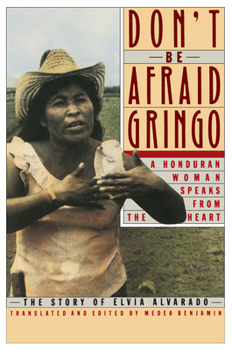Don't Be Afraid, Gringo: A Honduran Woman Speaks from the Heart: The Story of Elvia Alvarado
Select Format
Select Condition 
Book Overview
Here is a voice seldom heard, the voice of Latin America's majority, those who bear the burdens of society. If we are to understand Honduras, Central America, or, for that matter, Latin America, we must listen attentively to this voice. It has much to teach us. It commands the future. --E. Bradford Burns, Professor of History, UCLA Don't be Afraid, Gringo is the award-winning oral history of Elvia Alvarado, a courageous campesina...
Format:Paperback
Language:English
ISBN:006097205X
ISBN13:9780060972059
Release Date:July 1989
Publisher:Harper Perennial
Length:208 Pages
Weight:0.40 lbs.
Dimensions:0.5" x 5.3" x 8.0"
Customer Reviews
5 ratings
Strange Title
Published by Thriftbooks.com User , 16 years ago
A strange title for a book that sums up one of the problems of USA's intervention in Central America. Central American governments often apply their U.S. military aid to curtail any progressive social change and to reinforce their repressive government. Elvia Alvarado, a courageous Honduran woman that many would dismiss as simply a rabble-rouser is actually solving what many consider the main problem of the former banana republic countries. The small wealthy class owns most of the land to the extent that there is a large landless peasant "campesino" class. An agrarian reform law was passed in Honduras to lawfully award small sections of large unproductive estates to the campesinos to overcome this injustice in land ownership. The average campesino is ignorant of this law or their country's legal system. The situation really seems hopeless, but Elvia and selected leaders received training sponsored by the Catholic Church. The course trains them to organize the campesinos to demand their rights. The Campesino struggle is similar to the civil rights marches in the American South. They might be legally correct through a slow acting legal system, but they often meet the spontaneous violence of the local authorities before they gain legal access.. Other interesting points brought out by this book is the oppressive condition of women in campesino society. If a solid family structure is the building block of a healthy society then this is a failed society. Elvia's own story and others she alludes to demonstrates the disruption of family and the displacement of children brought about by beatings and live-in conditions offered women when no other alternative is available. I do not have any first hand knowledge of poverty to this degree, but I believe this is a good book (explanation) to try and understand why poverty still exists in some countries even though they have been the beneficiaries of large amounts of international aid. There was not too much of the text that dealt with "the Gringo" except to say that as the U.S. brought pressure to bear upon Nicaragua, repression by Honduran troops also ratcheted up. Other than that it is really an interesting account of a brave woman standing up for her rights. Well worth the read.
Campesinos And The Fight For Equal Rights
Published by Thriftbooks.com User , 16 years ago
A Honduran woman explains her world, her culture and the ongoing struggle for farmworker's rights. 'Don't Be Afraid, Gringo' was one of the very first books I ever read about indigenous Honduran culture, and Elvia Alvarado offers a compassionate voice for the poorest of the poor.
A realistic account
Published by Thriftbooks.com User , 18 years ago
Reading this book, it's important to remember that it wasn't written by someone with a formal, "liberal arts" education. That said, you need to use your own judgement to decide what's perhaps "biased", and what's not. Remember though, that whatever bias exists, exists for a reason, and should be taken in the context of what was going on at the time, as well as within the author's background. This isn't to say she's wrong, but in fact is correct on most issues, you just need to ensure that YOU the reader, are well versed on the subject (or are willing to become so) before reading this book. From my own experiences in the country, Alvarado seems dead on. Remember too, that the author has put herself in real peril to bring you this account, so plan on counting your blessings as you read.
powerful, fast read
Published by Thriftbooks.com User , 22 years ago
I went to Honduras on a short term mission trip last year and I've seen poverty first hand. This book has opened my eyes even further of the rural poor of Honduras. This is the story of a courageous woman who is helping her people overcome their unimaginable poverty by discovering the roots of it. In a subtle sense she denounces short term mission projects....that we come in to countries like hers and try to put a band-aid on a skull fracture. Americans, like myself, come into these third-world countries thinking we are fixing a country's problems in a couple weeks by donating old Gap t-shirts and building a few houses and then leaving. She urges the fact that if we are to really help the poor, we need to make a long-term commitment to get at the root of the problems. Shes not asking for sympathy, but for us to join us in her struggle. Get this book if you are ready to make a difference.
INSPIRING!
Published by Thriftbooks.com User , 25 years ago
A truly great read. Luckily, this book was assigned in my sociology class or else I probably would have never read it. It gives you an accurate portrait of peasant life in Honduras. If you want to be inspired read this book. After reading this book I feel like going down there to help them in some way. Her book is put in very simple terms and it is easy to see the injustices going on in her land. If you don't read it tell someone about the book. THANK YOU ELVIA!





